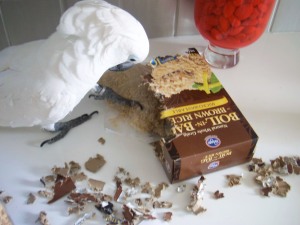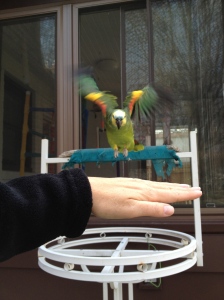
I sit here and type this as Rico, my umbrella cockatoo is chipping away on some wood I put on top of the cupboards in the kitchen. Yea, it is that photo to the left. This is not behavior I invite or encourage and the longer he chews and chips, the longer this behavior is being reinforced. The more I let him do this, the quicker he’ll fly to this destination in the future.
Nesting behaviors. Hormonal behaviors. Sexual behaviors. They are all natural behaviors and behaviors which bring about some common issues to companion parrot owners once, twice, several times throughout the year. These behaviors can accompany longer daylight hours in addition to several other factors in their daily life.
The reason I don’t like to encourage these behaviors or let them happen for long periods of time is because, in my household they can’t finish the job. There are no mates for any of my birds in this house. They can sit and build their nests, shred paper, go to cage bottoms, hide in boxes but there is nothing there to complete the process. There is no mate, there is no mating, there are no eggs, there are no chicks. I’m a big promoter of providing choice, consequences, and solvable solutions to our birds because it empowers them. This is why I’m a big promoter of foraging toys and providing objects in an array of forms for our birds to be given the opportunity to solve a puzzle, manipulate the object, and receive the reward. If the toy isn’t touched, it may be due to it being too complex for the individual bird. So, make it solvable for the bird. If a bird is faced with daily obstacles and tasks it cannot solve, it could cause other behavior issues, differing levels of frustration, and a sense of self-helplessness just to name a few. This is why I do not encourage or reinforce nesting behaviors. To me, this is a puzzle that is not solvable to a single bird and can cause high rates of frustration which can be shown in increases in behavior issues such as screaming, plucking, and feather destructive behaviors.
When I see one of my birds all of a sudden becoming interested in wooden pieces on toys and turning those pieces into toothpicks, I

make sure I’m observing if the bird is simply enjoying the toy or is it showing nesting behaviors in making wooden toys into tiny slivers of nesting material. Does this mean I pull the wooden toys? No, not at all. To me it reminds me to focus more on behavior and potential behavior issues.
I am careful of how, when, and what shreddable material I put in my bird’s cages. When I see phone books being torn to shreds, toys with boxes causing birds to click their beaks and put butts up in the air, I slowly begin removing these toys when the bird is not in the cage. I rarely throw shreddable boxes or shreddable toys on cage bottoms. From what I’ve observed, this can quickly and easily encourage and reinforce nesting behaviors.
A few other things that encourage sexual stimulation or nesting behaviors with our birds are petting under the wings and stroking the bird down it’s back. What I often see as a result of these behaviors are clicking beaks, butts up in the air, drooping wings, panting, and a bird perching with the wings slightly drooped begging for attention from the favored owner. I’d be very careful with this. This can bring on a plethora of behavior issues.
Stroking a bird down it’s back can be reinforcing for the owner because it causes the bird to stop screaming or stay calm while you finish your phone call or your favorite tv show. When we stroke the bird down its back it will stay in one location for quite a while. That’s because it is patiently waiting for the next move and when that doesn’t happen, frustration can occur in many forms such as a quick lunge and bite, screaming, begging, chasing of other members in the household, and flying to dark corners and rooms in houses.
A few other behaviors that can reinforce this behavior is allowing birds under blankets while we lay in bed or sit on the couch. Opening drawers in our dressers allowing birds to play in these dark cubby holes. If no behavior issues arise or form from these behaviors, that is great but often times they do and I know I’m repeating myself but I am because I feel it is so important to observe for the future of the bird. Make sure allowing these behaviors are not reinforcing other behavior issues and most of all causing high levels of frustration for our birds. Several years of reinforcing behaviors like this can cause a bird to lose its home and if other behaviors aren’t instead reinforced, it can make placement of that bird in another home more of a challenge.

So, what do I do instead? I encourage foraging at all times because it creates solvable puzzles for our birds to keep them mentally stimulated. I encourage teaching bird new behaviors through positive reinforcement training. Increase their amount of flying time. If your bird doesn’t fly you can encourage them to flap their wings or run across the floor playing with different objects. This burns off some of that built up energy and when they are burning off large amounts of energy, they need to rest and preen and forage for more food to replenish that burnt off energy.
We can set our birds up for success by reinforcing behaviors we want to see increase such as flying, playing, running, foraging, and socializing or interacting with others in our household. Parrots can live a long time and as much as I plan on taking care of my birds for the rest of their lives, it isn’t really likely. The likelihood of my birds outliving me is high. I can’t predict that I will be healthy enough to provide them the care they need for the rest of their lives. It would be selfish of me to keep my bird under my care when I can’t properly take care of it, just because I love the bird. I can prepare them for a successful future and as less stress as possible for a potential transition to a new home or environment. If I’m continuing to allow undesired behaviors to occur that reinforce behavior issues, I’m not preparing that bird for success in the bird’s future. To me, this is part of my responsibility as the caretaker of the animals that live with me. I owe them this. They provide me happiness. I need to make sure I can provide it to them also to the best of my ability.
Leave a Reply